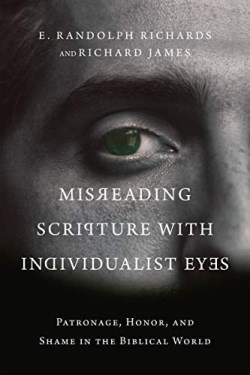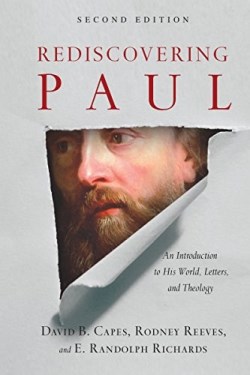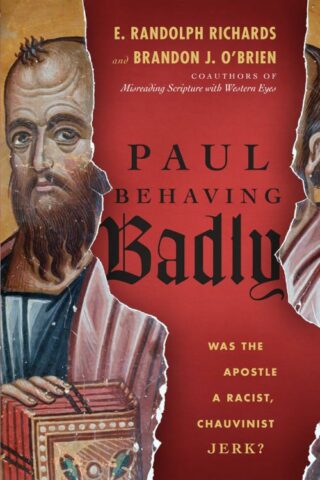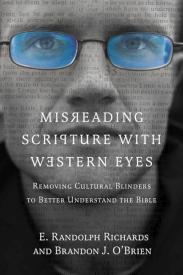E. Randolph Richards
Showing all 4 results
-
Misreading Scripture With Indivdualist Eyes
$32.00Add to cartThe Bible was written within collectivist cultures. When Westerners, immersed in individualism, read the Bible, it’s easy to misinterpret important elements-or miss them altogether. In any culture, the most important things usually go without being said. So to read Scripture well we benefit when we uncover the unspoken social structures and values of its world. We need to recalibrate our vision. Combining the expertise of a biblical scholar and a missionary practitioner, Misreading Scripture with Individualist Eyes is an essential guidebook to the cultural background of the Bible and how it should inform our reading. E. Randolph Richards and Richard James explore deep social structures of the ancient Mediterranean-kinship, patronage, and brokerage-along with their key social tools-honor, shame, and boundaries-that the biblical authors lived in and lie below the surface of each text. From Abraham, Sarah, and Hagar to Peter’s instructions to elders, the authors strip away individualist assumptions and bring the world of the biblical writers to life. Expanding on the popular Misreading Scripture with Western Eyes, this book makes clear how understanding collectivism will help us better understand the Bible, which in turn will help us live more faithfully in an increasingly globalized world.
-
Rediscovering Paul : An Introduction To His World Letters And Theology
$50.00Add to cartIntroduction: The Challenges Of Rediscovering Paul
1. Rediscovering Paul In His World
2. The Christophany
3. Paul, The Letter Writer
4. The Itinerant Paul: Galatians
5. The Itinerant Paul: The Thessalonian Letters
6. The Itinerant Paul: The Corinthian Letters
7. The Itinerant Paul: Romans
8. The Imprisoned Paul
9. The Pastoral Paul
10. Paul’s Theology And Spirituality
11. Paul’s Legacy
12. Paul’s Letters To Our Churches
Maps
Glossary
Bibliography
Author Index
Subject Index
Scripture IndexAdditional Info
For some of us, the apostle Paul is intimidating, like a distant and difficult uncle. We’re told he’s pretty important. We’ve even read some of the good parts of his letters. But he can come across as prickly and unpredictable. Not someone you’d like to hang out with at a coffee shop on a rainy day. He’d make a scene, evangelize the barista, and arouse looks across the room. For a mid-morning latte, we’d prefer Jesus over Paul.But Paul is actually the guy who-from Ephesus to Athens-was the talk of the marketplace, the raconteur of the Parthenon. He knew everyone, founded emerging churches, and held his own against the intellectuals of his day. Maybe it’s time to give Paul a break, let go of some stereotypes, and try to get to know him on his own terms.
If you’re willing to give Paul a try, Rediscovering Paul is your reliable guide. This is a book that reacquaints us with Paul, as if for the first time-arrested by Christ on the Damascus Road, holding forth in the marketplace of Corinth, working with a secretary in framing his letter to the Romans, or dealing with the messiness of emerging churches from Ephesus to Rome.
Drawing on the best of contemporary scholarship, and with language shaped by teaching and conversing with today’s students, Rediscovering Paul is a textbook that has passed the test. Now in an expanded edition, it’s better than ever. There are fresh discussions of Paul’s letter writing and how those letters were received in the churches, new considerations of pseudonymity and the authenticity of Paul’s letters, and updated coverage of recent developments in interpreting Paul. In addition, the “So What?” feature-much loved by students-has been expanded. For considering the full range of issues, from Paul’s conversion and call to his ongoing impact on church and culture, this second edition of Rediscovering Paul comes enthusiastically recommended.
-
Paul Behaving Badly
$22.00Add to cartThe apostle Paul was kind of a jerk. He was arrogant and stubborn. He called his opponents derogatory, racist names. He legitimized slavery and silenced women. He was a moralistic, homophobic killjoy who imposed his narrow religious views on others. Or was he? Randolph Richards and Brandon O’Brien explore the complicated persona and teachings of the apostle Paul. Unpacking his personal history and cultural context, they show how Paul both offended Roman perspectives and scandalized Jewish sensibilities. His vision of Christian faith was deeply disturbing to others in his day and remains so in ours. Paul behaved badly, but not just in the ways we might think. Take another look at Paul and see why this “worst of sinners” dares to say, “Follow my example, as I follow the example of Christ.”
-
Misreading Scripture With Western Eyes
$22.00Add to cartIntroduction: Coming To Terms With Our Cultural Blinders
Part One: Above The Surface
1. Serving Two Masters: Mores
2. The Bible In Color: Race And Ethnicity
3. Just Words? LanguagePart Two: Just Below The Surface
4. Captain Of My Soul: Individualism And Collectivism
5. Have You No Shame? Honor/Shame And Right/Wrong
6. Sand Through The Hourglass: TimePart Three: Deep Below The Surface
7. First Things First: Rules And Relationships
8. Getting Right Wrong: Virtue And Vice
9. Its All About Me: Finding The Center Of Gods WillConclusion: Three Easy Steps For Removing Our Cultural Blinders?
Acknowledgments
Resources For Further Exploration
NotesAdditional Info
What was clear to the original readers of Scripture is not always clear to us. Because of the cultural distance between the biblical world and our contemporary setting, we often bring modern Western biases to the text. For example: When Western readers hear Paul exhorting women to “dress modestly,” we automatically think in terms of sexual modesty. But most women in that culture would never wear racy clothing. The context suggests that Paul is likely more concerned about economic modesty–that Christian women not flaunt their wealth through expensive clothes, braided hair and gold jewelry.Some readers might assume that Moses married “below himself” because his wife was a dark-skinned Cushite. Actually, Hebrews were the slave race, not the Cushites, who were highly respected. Aaron and Miriam probably thought Moses was being presumptuous by marrying “above himself.”Western individualism leads us to assume that Mary and Joseph traveled alone to Bethlehem. What went without saying was that they were likely accompanied by a large entourage of extended family. Biblical scholars Brandon O’Brien and Randy Richards shed light on the ways that Western readers often misunderstand the cultural dynamics of the Bible. They identify nine key areas where modern Westerners have significantly different assumptions about what might be going on in a text. Drawing on their own crosscultural experience in global mission, O’Brien and Richards show how better self-awareness and understanding of cultural differences in language, time and social mores allow us to see the Bible in fresh and unexpected ways. Getting beyond our own cultural assumptions is increasingly important for being Christians in our interconnected and globalized world. Learn to read Scripture as a member of the global body of Christ.




